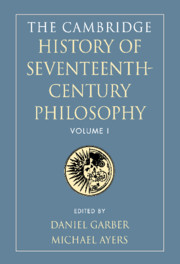Book contents
- Frontmatter
- Introduction
- I The context of seventeenth-century philosophy
- II Logic, language, and abstract objects
- III God
- 10 The idea of God
- 11 Proofs of the existence of God
- 12 The Cartesian dialectic of creation
- 13 The relation between theology and philosophy
- 14 The religious background of seventeenth-century philosophy
- IV Body and the physical world
- V Spirit
- Bibliographical appendix
- Bibliography
- References
10 - The idea of God
from III - God
Published online by Cambridge University Press: 28 March 2008
- Frontmatter
- Introduction
- I The context of seventeenth-century philosophy
- II Logic, language, and abstract objects
- III God
- 10 The idea of God
- 11 Proofs of the existence of God
- 12 The Cartesian dialectic of creation
- 13 The relation between theology and philosophy
- 14 The religious background of seventeenth-century philosophy
- IV Body and the physical world
- V Spirit
- Bibliographical appendix
- Bibliography
- References
Summary
POSING THE QUESTION
The seventeenth century marks a significant moment in thought concerning the definition of God. This is the period in which the radical position of subjectivity is replaced by the impersonal recognition of transcendence as a point of departure of philosophical reflection – God is now a term in a demonstration, and no longer the assumed goal of a journey towards Him. And philosophy, until this time explicitly constituted by metaphysics (metaphysica, philosophia prima, then ontologia), has to transpose into the new domain of rationality certain problems and concepts previously treated only by revealed theology (theologia, sacra scientia). This twofold transformation is nicely illustrated by the problem of the essence of God: from Descartes on, metaphysical discussions of the characteristics and attributes of God consist in transposing and translating, so to speak, into purely philosophical terms theological debates on the divine names as they arise until the Scriptures, through the intermediation of the formulations given of them by Pseudo-Dionysius the Areopagite (fifth century?) in his celebrated treatise De divinis nominibus.
These innovations can best be understood in their context, a set of themes from Thomas Aquinas. Despite the long gap between the thirteenth century and the seventeenth, Thomas's views remained decisive for several reasons. The first was the renewal of the ‘Thomistic’ school: notably through the works of Capreolus, Sylvestre de Ferrare, and especially Cardinal Thomas de Vio, called Cajetan (1469–1534). These Thomists widely influenced university and ecclesiastical life, in particular the work of the Council of Trent (1545–63), whose sessions were presided over by a copy of the Summa theologiae placed upon the altar.
- Type
- Chapter
- Information
- The Cambridge History of Seventeenth-Century Philosophy , pp. 263 - 304Publisher: Cambridge University PressPrint publication year: 2000

